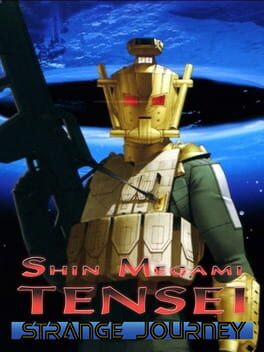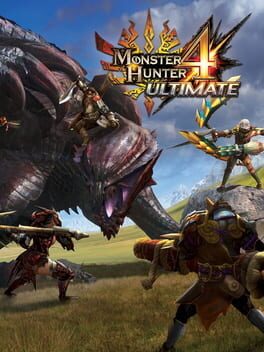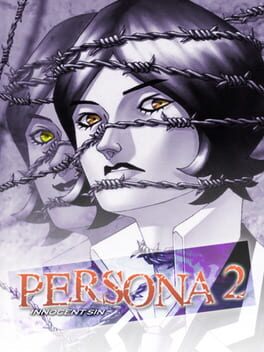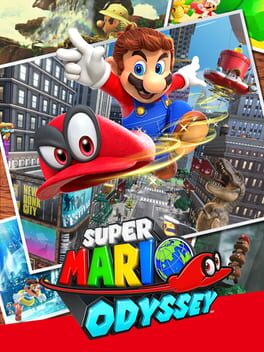SquidYouKnow
23 reviews liked by SquidYouKnow
Xenogears
1998
my childhood. games dont do it like this anymore. hundreds of hours of content contained on one 3ds cartridge. no dlc purchase required. i love modern monster hunter but i never find myself able to sink as much time into them as i could with this game. seemingly infinite content with tons of free updates in its prime, i fucking loved this game and i didnt even have friends to play it with
The Legend of Zelda
1986
It's always nice when you play through a game again after nearly 10 years and you end up appreciating the game a bit more!
Is Zelda 1 a hard game to get into in 2023? Absolutely, and I can see why this game would be off-putting to so many people. But, if you can get past the oldness and clunkiness here, you get a game that's incredibly impressive for it's time. It shows a game philosophy that you don't see as often nowadays: a game built around community. A game that's designed to share secrets about it with your elementary school classmates. A pre internet gem. It has it's issues, but in the end it's so charming and unique that I think it's worth going back to nowadays.
Is Zelda 1 a hard game to get into in 2023? Absolutely, and I can see why this game would be off-putting to so many people. But, if you can get past the oldness and clunkiness here, you get a game that's incredibly impressive for it's time. It shows a game philosophy that you don't see as often nowadays: a game built around community. A game that's designed to share secrets about it with your elementary school classmates. A pre internet gem. It has it's issues, but in the end it's so charming and unique that I think it's worth going back to nowadays.
Killer7
2005
writing this immediately after finishing the game. i should have probably played this on the ps1 but the combat never really bothered me since my emulator came with speedup (if you play the psp version this is almost essential) which really helped my experience. the combat sucks, in comparison to persona 3+, and the game is extremely easy overall. i only had one boss fight that gave me trouble. its more akin to smt in that it centers around many small dungeons instead of one or many large ones, which i think the game benefits from.
maybe my expectations were too high going into it but i didnt connect with this game as much as i thought i would. the story is fucking batshit crazy but the ending saves it. really the ending saved this game from being a 7 and pushed it up to around an 8.5. some parts of the story my jaw was definitely glued to the floor and that includes the ending.
the characters are pretty good, but this game made me realize how the calendar and social link system reealllyyy fleshes out the characters to their best extent. while the story provided adequate character development and background for the main cast, the little moments in persona 3+ where the party is bantering and bickering really add to my connection with the characters in a way i hadn't realized. dont get me wrong the characters in this game are great, i just wish we had a chance to see more of them since most of the game revolves around dungeon crawling.
overall its a really good game, perhaps on par with 5 but i think 3 remains my favorite. maybe this review will change after i play eternal punishment. stay tuned
maybe my expectations were too high going into it but i didnt connect with this game as much as i thought i would. the story is fucking batshit crazy but the ending saves it. really the ending saved this game from being a 7 and pushed it up to around an 8.5. some parts of the story my jaw was definitely glued to the floor and that includes the ending.
the characters are pretty good, but this game made me realize how the calendar and social link system reealllyyy fleshes out the characters to their best extent. while the story provided adequate character development and background for the main cast, the little moments in persona 3+ where the party is bantering and bickering really add to my connection with the characters in a way i hadn't realized. dont get me wrong the characters in this game are great, i just wish we had a chance to see more of them since most of the game revolves around dungeon crawling.
overall its a really good game, perhaps on par with 5 but i think 3 remains my favorite. maybe this review will change after i play eternal punishment. stay tuned
Resident Evil 4
2023
It doesn’t replicated the same feelings of awe that the original did. Its also too timid to try and chart its own trajectory as a spiritual remake that plays by its own rules. Instead, Capcom decided to not mess with the winning formula they created so long ago and what differences it has aim for refinement and better cohesion; introducing RE4 to the modern era. In that, this is a successful package that’s well worth your time for both avid fans and newcomers alike.
Hi-Fi Rush
2023
Miss a beat in Hi-fi Rush and Chai will attack on beat anyway. It’s probably unreasonable to expect it to punish this sort of thing in the same ways that other rhythm action hybrids like Patapon, Metal Hellsinger or Cadence of Hyrule do, because it’s so notable in part specifically for being so different from everything else, but there’s being different and then there’s being disincentivisingly handholdy. It’s a symptom of a larger problem – Hi-fi Rush seems almost afraid of allowing the player to fail.
With a scarce few exceptions like one of the final boss’ more belligerent attacks, the contrast between proper timing and mistiming in Hi-fi Rush isn’t success versus failure, it’s success versus negligibly less success. It’s true that enough mistimed attacks can detract from your final rank, but this is inconsistent with how assist attacks contribute to your score despite not requiring any timing at all (exacerbated by their charitable cooldowns), as does an offbeat jump if it ‘avoids’ an enemy’s attack that was nowhere near you anyhow, and the penalty’s so minor it’s hard to notice. Rhythm Master difficulty goes some way toward assuaging all this by giving you an immediate game over if your rhythm meter falls below C, but it’s not hugely impactful because of the aforementioned inconsistencies, while the fact that it’s only available after beating the game also makes the common action game mantra of “the first playthrough is the tutorial” feel unfortunately literal.
As another example of this, Hi-fi Rush affords the player a generous helping of attack magnetism, or whatever you prefer to call the melee equivalent of aim assist that’s particularly common in western action games. Chai’s mobility is so rigid that I imagine the designers may have felt the absence of this might’ve led to a frustrating amount of dropped combos. Even still, it’s at best unnecessary given that Chai already has an equivalent of Nero’s Snatch from DMC4 & 5, and at worst a net negative for how it diminishes positioning. It doesn’t stop Hi-fi Rush from getting better as you yourself do, like any other worthwhile action game, but being able to both feel and see the developers artificially nudging things in your favour like this does cheapen the appeal of getting to grips with what is, in the grand scheme of things, quite a cool combat system.
Apparent influences from other action games, like its equivalent of Astral Chain & Bayonetta 3’s wink attacks, lend themselves naturally to the combat’s rhythm-based formula and complement the game’s lovely presentation well. Environmental doodads bounce to the beat like in Metal Hellsinger, diegetically communicating helpful information to the player not only in terms of timing but also because enemies always attack to the beat, which ensures consistency on their part (albeit hampering their ability to surprise you). Another caveat to the combat’s strengths, though, is that there isn’t really enough of it, at least until you unlock Rhythm Tower i.e. the Bloody Palace analogue.
Most levels in Hi-fi Rush are very long by action game standards and a hefty proportion of nearly all of them consists of platforming segments. This sounds inoffensive in a vacuum, particularly for a genre in which “gimmick” seems to be a dirty word in most people’s minds, until the stiffness of Chai’s movement and the absence of a proper bossfight for two or three entire chapters in the game’s midsection make it apparent how drawn-out these sections often are. The latter feels especially deflating because the bosses that are here are of a really high standard, being diverse both visually and mechanically, with a huge amount of effort and artistry gone into even just the freezeframes in their introduction cutscenes. I’d much rather have had a couple more of them than be Letz Shaked twice in a row.
What makes it feel especially disappointing to be part of the internet’s propensity for contrarian armchair criticism, aside from the fact that Hi-fi Rush couldn’t be any more up my street conceptually, is that it isn’t a game that deserves to be ragged on like this. At the end of the day, this is a new IP in an historically niche genre that’s feature-complete out of the box, bereft of tonal carcinogens like irony or cynicism, stuffed with substantial post-game unlocks and has Korsica in it. It’s just also one which is eclipsed several times over in depth, variety, pacing and general well-consideredness by any number of other action games both modern and from the period it’s a love letter to, which don’t tend to lack for sincerity, charm or bonus content in the first place.
Is it funny, deserving of success and easy to recommend to anyone interested in action games despite this? Yup. Is it the best action game ever, as suggested by its average rating here (at the time of writing) and elsewhere? That's kind of wild. I’m potentially open to the idea that Hi-fi Rush is in the top seven or so best games that Masaaki Yamada has worked on.
More firmly, I’m genuinely delighted that Tango’s thrown its hat into the action game ring and that doing so’s rewarded its clearly, transparently talented staff with their most unambiguous success so far. I’d love even more to be able to speak of them in the same vein as Capcom or Platinum or Team Ninja who, barring one or two semi-recent and enormously overemphasised missteps apiece, have long comprised a reliable triumvirate of quality action experiences which light up my frontal lobe in a way few other developers can. How often I found myself smiling during Hi-fi Rush’s cutscenes and character interactions versus actually playing the game means that I can’t yet, but it’s still promising enough to be indicative of their potential to someday join them on stage as one of the action genre’s rockstars.
With a scarce few exceptions like one of the final boss’ more belligerent attacks, the contrast between proper timing and mistiming in Hi-fi Rush isn’t success versus failure, it’s success versus negligibly less success. It’s true that enough mistimed attacks can detract from your final rank, but this is inconsistent with how assist attacks contribute to your score despite not requiring any timing at all (exacerbated by their charitable cooldowns), as does an offbeat jump if it ‘avoids’ an enemy’s attack that was nowhere near you anyhow, and the penalty’s so minor it’s hard to notice. Rhythm Master difficulty goes some way toward assuaging all this by giving you an immediate game over if your rhythm meter falls below C, but it’s not hugely impactful because of the aforementioned inconsistencies, while the fact that it’s only available after beating the game also makes the common action game mantra of “the first playthrough is the tutorial” feel unfortunately literal.
As another example of this, Hi-fi Rush affords the player a generous helping of attack magnetism, or whatever you prefer to call the melee equivalent of aim assist that’s particularly common in western action games. Chai’s mobility is so rigid that I imagine the designers may have felt the absence of this might’ve led to a frustrating amount of dropped combos. Even still, it’s at best unnecessary given that Chai already has an equivalent of Nero’s Snatch from DMC4 & 5, and at worst a net negative for how it diminishes positioning. It doesn’t stop Hi-fi Rush from getting better as you yourself do, like any other worthwhile action game, but being able to both feel and see the developers artificially nudging things in your favour like this does cheapen the appeal of getting to grips with what is, in the grand scheme of things, quite a cool combat system.
Apparent influences from other action games, like its equivalent of Astral Chain & Bayonetta 3’s wink attacks, lend themselves naturally to the combat’s rhythm-based formula and complement the game’s lovely presentation well. Environmental doodads bounce to the beat like in Metal Hellsinger, diegetically communicating helpful information to the player not only in terms of timing but also because enemies always attack to the beat, which ensures consistency on their part (albeit hampering their ability to surprise you). Another caveat to the combat’s strengths, though, is that there isn’t really enough of it, at least until you unlock Rhythm Tower i.e. the Bloody Palace analogue.
Most levels in Hi-fi Rush are very long by action game standards and a hefty proportion of nearly all of them consists of platforming segments. This sounds inoffensive in a vacuum, particularly for a genre in which “gimmick” seems to be a dirty word in most people’s minds, until the stiffness of Chai’s movement and the absence of a proper bossfight for two or three entire chapters in the game’s midsection make it apparent how drawn-out these sections often are. The latter feels especially deflating because the bosses that are here are of a really high standard, being diverse both visually and mechanically, with a huge amount of effort and artistry gone into even just the freezeframes in their introduction cutscenes. I’d much rather have had a couple more of them than be Letz Shaked twice in a row.
What makes it feel especially disappointing to be part of the internet’s propensity for contrarian armchair criticism, aside from the fact that Hi-fi Rush couldn’t be any more up my street conceptually, is that it isn’t a game that deserves to be ragged on like this. At the end of the day, this is a new IP in an historically niche genre that’s feature-complete out of the box, bereft of tonal carcinogens like irony or cynicism, stuffed with substantial post-game unlocks and has Korsica in it. It’s just also one which is eclipsed several times over in depth, variety, pacing and general well-consideredness by any number of other action games both modern and from the period it’s a love letter to, which don’t tend to lack for sincerity, charm or bonus content in the first place.
Is it funny, deserving of success and easy to recommend to anyone interested in action games despite this? Yup. Is it the best action game ever, as suggested by its average rating here (at the time of writing) and elsewhere? That's kind of wild. I’m potentially open to the idea that Hi-fi Rush is in the top seven or so best games that Masaaki Yamada has worked on.
More firmly, I’m genuinely delighted that Tango’s thrown its hat into the action game ring and that doing so’s rewarded its clearly, transparently talented staff with their most unambiguous success so far. I’d love even more to be able to speak of them in the same vein as Capcom or Platinum or Team Ninja who, barring one or two semi-recent and enormously overemphasised missteps apiece, have long comprised a reliable triumvirate of quality action experiences which light up my frontal lobe in a way few other developers can. How often I found myself smiling during Hi-fi Rush’s cutscenes and character interactions versus actually playing the game means that I can’t yet, but it’s still promising enough to be indicative of their potential to someday join them on stage as one of the action genre’s rockstars.
Super Mario Odyssey
2017
Primera vez en la historia de Super Mario que una de sus entregas principales sabe a decadencia. Nunca antes, ni siquiera en los juegos más derivativos de la serie principal (World, Galaxy 2, 3D World), había olido a falta de ideas nuevas. Hasta ahora.
Super Mario Odyssey es un Greatest Hits encubierto. El viaje que hacemos por los distintos mundos del juego bien puede interpretarse como una visita guiada a través de los distintos títulos de la saga. Hay 64 en la filosofía híbrida de los niveles y el nostalgia trip del Reino Champiñón, hay Sunshine en la extensión de movimientos de Cappy y la arquitectura realista (y vertical) de New Donk City, hay Galaxy en el diseño de los power-ups y la navegación del Reino de Bowser, y hay 3D Land en algunos de los tramos más plataformeros para obtener lunas. Hasta la vertiente 2D de la saga tiene su hueco en numerosos desafíos bidimensionales, con Mario pixelándose y dándonos un botón para acelerar. La banda sonora es así también, en ella hay de todo (ritmo, ambiente, épica...), y de un mundo a otro no permanece intacta ni la estética. Esto es un popurrí, y para cuando llegamos a la celebración del festival (con homenaje al Donkey Kong original incluido) nos damos cuenta de qué tipo: rebozado. Odyssey tiene sabor a repaso, a nivel final rememorando lo aprendido made by Nintendo.
Y lo preocupante es la razón de esta mirada atrás. Cappy poseyendo cuerpos a modo de reinterpretación del power-up de toda la vida es quizá el mayor fracaso de la historia de Super Mario. Nunca ha tenido el jugador tantas opciones y formas de jugar, y nunca habían sido estas tan evidentemente accesorias, planas, gimmicks. De usar y tirar. Pareciera una metáfora involuntaria del punto en que se encuentra la saga con Odyssey: Mario poseyendo cuerpos para resolver lo que toca y luego a otra cosa es Nintendo tratando de buscar nuevas vías para su saga y fracasando en cada intento. Después de tres décadas parece no quedar nada dentro de Mario, así que toca buscar fuera, pero la búsqueda resulta infructuosa y no da respuestas. A cada nuevo cuerpo, un par de usos y hasta luego; a cada nuevo intento, un fracaso y vuelta a saltar. No se libra ni el moveset de Cappy, la mayor baza del juego. Los combos saltimbanquis son rebuscados y extremos, otro intento desesperado por hacer algo nuevo con el movimiento. Ni siquiera tienen lógica, tan solo existen, y el jugador aprende a dominarlos porque exprimir sus mecánicas es satisfactorio en sí mismo (algo que Super Mario, por suerte, todavía no ha perdido).
La experiencia de jugar Odyssey consiste en pasar por un conglomerado de convenciones de diseño de Mario en pos de recolectar lunas. Hay exploración, coleccionismo, retos de habilidad y de todo. Y una gran parte del mix agota, se siente trabajo. Habrá quien diga que, como nosotros elegimos las lunas que queremos obtener, es culpa nuestra si acabamos realizando misiones aburridas en vez de ir a por la parte divertida. A este argumento yo replicaría que la realidad de la experiencia de jugar Odyssey es otra: el jugador explora los mundos que se le presentan e inevitablemente, por su objetivo de dar con y acumular lunas, trata de hacerse con las que se le cruzan por delante, o al menos la mayoría. Como consecuencia, una parte sustancial del juego será aburrida e insatisfactoria, dejando mal sabor de boca.
Super Mario Odyssey es un Greatest Hits encubierto. El viaje que hacemos por los distintos mundos del juego bien puede interpretarse como una visita guiada a través de los distintos títulos de la saga. Hay 64 en la filosofía híbrida de los niveles y el nostalgia trip del Reino Champiñón, hay Sunshine en la extensión de movimientos de Cappy y la arquitectura realista (y vertical) de New Donk City, hay Galaxy en el diseño de los power-ups y la navegación del Reino de Bowser, y hay 3D Land en algunos de los tramos más plataformeros para obtener lunas. Hasta la vertiente 2D de la saga tiene su hueco en numerosos desafíos bidimensionales, con Mario pixelándose y dándonos un botón para acelerar. La banda sonora es así también, en ella hay de todo (ritmo, ambiente, épica...), y de un mundo a otro no permanece intacta ni la estética. Esto es un popurrí, y para cuando llegamos a la celebración del festival (con homenaje al Donkey Kong original incluido) nos damos cuenta de qué tipo: rebozado. Odyssey tiene sabor a repaso, a nivel final rememorando lo aprendido made by Nintendo.
Y lo preocupante es la razón de esta mirada atrás. Cappy poseyendo cuerpos a modo de reinterpretación del power-up de toda la vida es quizá el mayor fracaso de la historia de Super Mario. Nunca ha tenido el jugador tantas opciones y formas de jugar, y nunca habían sido estas tan evidentemente accesorias, planas, gimmicks. De usar y tirar. Pareciera una metáfora involuntaria del punto en que se encuentra la saga con Odyssey: Mario poseyendo cuerpos para resolver lo que toca y luego a otra cosa es Nintendo tratando de buscar nuevas vías para su saga y fracasando en cada intento. Después de tres décadas parece no quedar nada dentro de Mario, así que toca buscar fuera, pero la búsqueda resulta infructuosa y no da respuestas. A cada nuevo cuerpo, un par de usos y hasta luego; a cada nuevo intento, un fracaso y vuelta a saltar. No se libra ni el moveset de Cappy, la mayor baza del juego. Los combos saltimbanquis son rebuscados y extremos, otro intento desesperado por hacer algo nuevo con el movimiento. Ni siquiera tienen lógica, tan solo existen, y el jugador aprende a dominarlos porque exprimir sus mecánicas es satisfactorio en sí mismo (algo que Super Mario, por suerte, todavía no ha perdido).
La experiencia de jugar Odyssey consiste en pasar por un conglomerado de convenciones de diseño de Mario en pos de recolectar lunas. Hay exploración, coleccionismo, retos de habilidad y de todo. Y una gran parte del mix agota, se siente trabajo. Habrá quien diga que, como nosotros elegimos las lunas que queremos obtener, es culpa nuestra si acabamos realizando misiones aburridas en vez de ir a por la parte divertida. A este argumento yo replicaría que la realidad de la experiencia de jugar Odyssey es otra: el jugador explora los mundos que se le presentan e inevitablemente, por su objetivo de dar con y acumular lunas, trata de hacerse con las que se le cruzan por delante, o al menos la mayoría. Como consecuencia, una parte sustancial del juego será aburrida e insatisfactoria, dejando mal sabor de boca.









